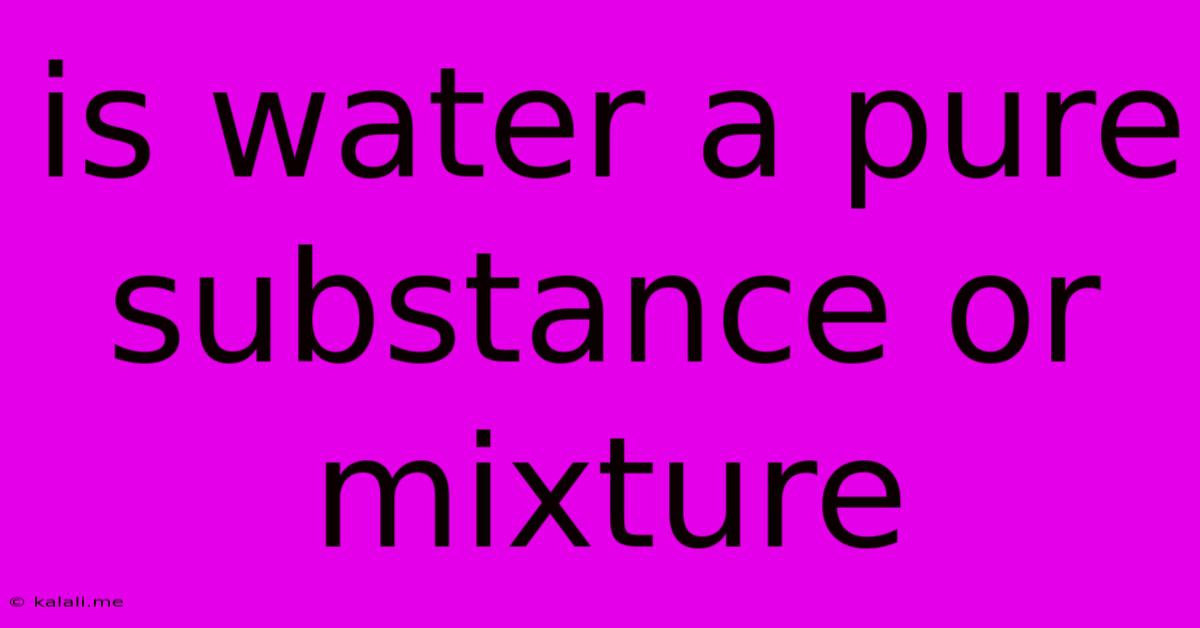Is Water A Pure Substance Or Mixture
Kalali
Jun 02, 2025 · 3 min read

Table of Contents
Is Water a Pure Substance or a Mixture? A Deep Dive into H₂O
Is water a pure substance or a mixture? This seemingly simple question opens the door to a fascinating exploration of chemistry and the definition of purity itself. While we often think of water as simply H₂O, the reality is a bit more nuanced. This article will delve into the chemical composition of water and definitively answer the question, while also exploring the complexities of different types of water we encounter daily.
Understanding Pure Substances and Mixtures
Before diving into the specifics of water, let's clarify the fundamental difference between a pure substance and a mixture.
-
Pure Substance: A pure substance is a form of matter that has a constant composition and properties throughout the sample. It cannot be separated into simpler substances by physical methods. Examples include elements (like oxygen or gold) and compounds (like table salt or sugar).
-
Mixture: A mixture is a combination of two or more substances that are not chemically bonded. The components retain their individual properties, and the composition can vary. Mixtures can be homogeneous (uniform composition throughout, like saltwater) or heterogeneous (non-uniform composition, like sand and water).
The Case of Water: Pure H₂O
Chemically pure water, as represented by the formula H₂O, is indeed a pure substance. It is a compound formed by the chemical bonding of two hydrogen atoms and one oxygen atom. This bonding creates a unique molecule with specific properties, such as its boiling point and density. You cannot physically separate pure water into hydrogen and oxygen; you need a chemical reaction (like electrolysis) to achieve this.
But... is Tap Water Pure?
The water we typically use – tap water, for example – is not chemically pure. It contains various dissolved minerals, gases, and sometimes even contaminants. These impurities, even in small amounts, change the water's properties and classify it as a mixture. The composition of tap water varies depending on the source and treatment processes.
Types of Impurities in Water:
- Dissolved Minerals: These include calcium, magnesium, sodium, and others, contributing to water hardness.
- Dissolved Gases: Oxygen, nitrogen, and carbon dioxide can dissolve in water.
- Contaminants: These can range from bacteria and viruses to industrial chemicals, depending on the source and pollution levels.
Different Forms of Water: Still a Mixture?
Consider other forms of water:
- Seawater: A complex mixture of water and various salts, minerals, and organic matter.
- Mineral Water: Water containing various dissolved minerals, often marketed for their purported health benefits.
- Bottled Water: While often purified, bottled water may still contain trace amounts of minerals and other substances.
Conclusion: Context Matters
Therefore, the answer to "Is water a pure substance or a mixture?" is nuanced. Chemically pure water (H₂O) is a pure substance, a compound. However, the water we encounter in everyday life is typically a mixture, containing various dissolved substances and potential contaminants. The level of purity depends heavily on the source and treatment the water has undergone. Understanding this distinction is crucial for appreciating the complexity of this essential substance and its role in our world.
Latest Posts
Latest Posts
-
Layer Separation And Splitting 3d Printing
Jun 04, 2025
-
A Person Who Knows A Lot About A Particular Subject
Jun 04, 2025
-
Can You Eat The Seeds In Guava
Jun 04, 2025
-
Substitute Flour For Self Rising Flour
Jun 04, 2025
-
Play It Close To The Vest
Jun 04, 2025
Related Post
Thank you for visiting our website which covers about Is Water A Pure Substance Or Mixture . We hope the information provided has been useful to you. Feel free to contact us if you have any questions or need further assistance. See you next time and don't miss to bookmark.